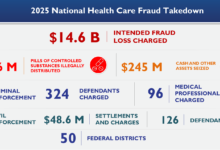Nurse substitution needs to be addressed, urge RCN members

Nurses have renewed demands to protect the role of the nurse, as fears remain that registered nursing associates and non-registered support workers are being improperly used to perform tasks beyond their scope.
London nurse Samantha Spence opened a debate about this topic at RCN’s annual congress, held in Newport this week.
“There is no financial shortcut to gold standard patient care”
Sandy Harding
Ms Spence spoke about the impact of substitution and warned that the Nursing and Midwifery Council’s implementation of nursing associates gave NHS trusts too much of a say over what they can and cannot be deployed for.
She described it as NHS trusts “marking their own homework”.
Ms Spence said the RCN’s current position on the substitution of registered nurses should “go further”.
Currently, RCN defines nurse substitution as the deliberate and planned replacement of a registered nurses with either a member of the nursing suport workforce or another health profession.
However, Ms Spence said it was her view that the definition should be broader and include “when other healthcare professionals cover registered nurse gaps, no matter the length or circumstances of the substitution”.
Support workers have, according to Cornwall-based nurse Michael Wincott, been performing tasks such as catheterisation and compression bandaging in some areas of the UK.
“[These] were typically, in the past, higher-band responsibilities,” said Mr Wincott.
“These colleagues will earn £10,000-12,000 less than me, as a band 5; it’s just not right.”
Mr Wincott spoke about the “pitfalls” of using lower-banded staff for duties which would traditionally be done by registered nurses.
“I’ve heard managers suggesting [bringing in] band 3 staff over [higher] banded staff to cut costs,” he said.
“While demands obviously fluctuate, we must guard against the creep of replacing higher bands with lower ones.”
Sagila Thiruthanikasalan, a registered nursing associate, also said it was unfair that lower-banded staff such as her were not “financially valued” for the increasingly complex tasks they perform – some of which were formerly the realm of registered nurses.
She told congress: “I have had the privilege, and unfortunate experience, of being a trainee nursing associate and now a registered nursing associate.
“[I have seen] how staff are [substituted], and it’s not just nursing associates, as colleagues said, it’s also healthcare support workers assessing complex wounds in the community, healthcare support workers providing complex level two or level three care.
“But it should be registrants’ jobs, and they should be financially valued for it because it’s complex skills we’re carrying out.”
Dionne Daniel, representing RCN members in the Outer South West London branch, said that, in her experience, substitution was being done to reduce costs.
“These colleagues will earn £10,000-12,000 less than me, as a band 5; it’s just not right”
Michael Wincott
“There’s a danger [with saving] money in the short term, it can have an impact on our patients and our staff,” she said.
“They will impact retention and recruitment in the future. So, I will urge that we do a lot of work around substitution; it should not happen.”
Ms Daniel added, however, that registered nurses needed to have respect for the work that lower-banded nursing staff, like support workers and nursing associates, carried out.
“Sometimes when we have this conversation, there might be an option for people to feel… we don’t value the other members of the nursing family,” she said.
“And I just want to be clear, it’s not the case.”
The debate was not the first time nurses have demanded action on the issues of substitution and role creep.
Ever since the announcement of the registered nursing associate role in England, the RCN has demanded employers not use it as a cheaper replacement for nurses.
These warnings were reiterated by the Wales branch of the union earlier this year when the devolved government announced it was seeking to introduce nursing associates there, too.
In a new statement released after the debate at congress, Sandy Harding, associate director of nursing (professional practice) for RCN Wales, said: “The evidence is clear: the professional knowledge, expansive skills and judgement of the registered nurse makes a critical difference to patient safety.
“It is essential that registered nurses are not [substituted] to fill the 2,717 vacancies we currently have in Wales. We must also ensure that funding for registered nurse education and the existing workforce budget in Wales is protected.
“There is no financial shortcut to gold standard patient care. Long term investment in nursing will ensure the sustainable future of the workforce and of the NHS.”






